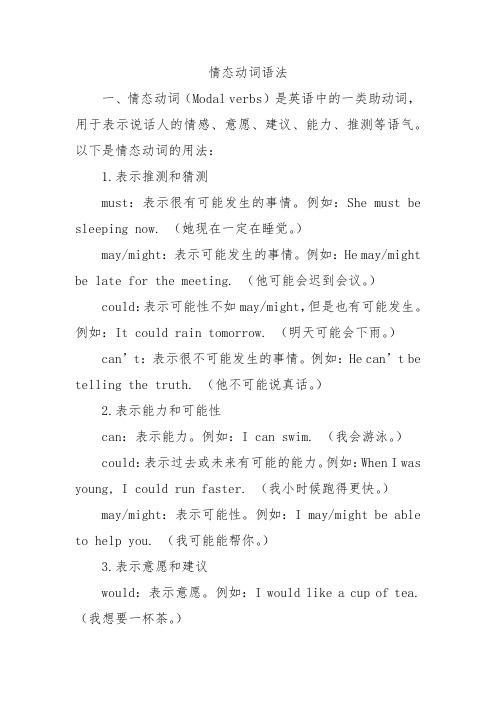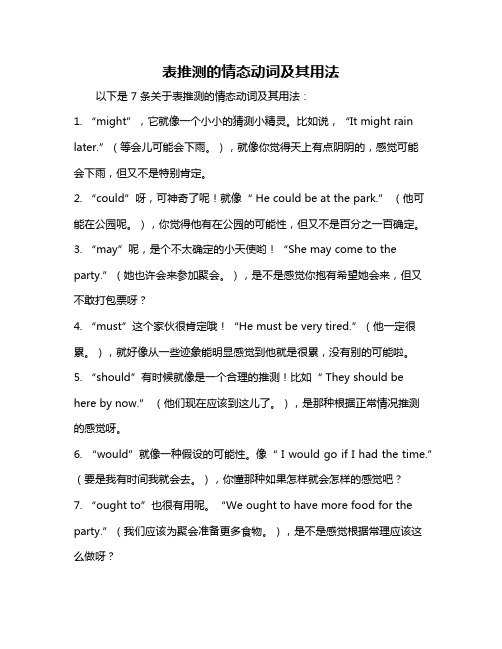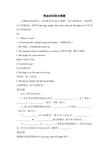情态动词表示猜测
情态动词表猜测的用法

情态动词表猜测的用法情态动词must,can,could,should,may,might 等可以用在句中表示猜测。
1.“情态动词+动词原形”表示对现在或将来情况的猜测I don’t know where she is. She may be in Wuhan.2.“情态动词+进行式”表示对现在或将来正在进行的情况的猜测At this moment, our teacher must be correcting our exam papers.3.“情态动词+完成式”表示对过去情况的猜测You must have been caught in the rain on your way home yesterday.4.“情态动词+完成进行式”表示对过去正在进行的情况的猜测Your mother must have been looking for you.5.推测的否定形式用can’t/couldn’t,may not/might not表示Mike can’t have found his car, for he came to work by bus this morning.6.句子中含有表示猜测的情态动词时,其反意疑问句的构成不能再用原句中的情态动词,而应根据原句在去掉情态动词的情况下的主谓关系来确定其反问形式。
①The man in the white clothes must be adoctor, isn’t he?②She must have seen the film before,hasn’t she?③He must have an uncle abroad, doesn’the?④You must have met Uncle Wang in theshop yesterday, didn’t you?7.在表示“猜测”方面的区别情态动词must,can,could,should,may,might 都可以用于表示“猜测”(注意:could, might 表示推测时不表示时态, 其推测的程度不如can, may)。
情态动词表示猜测

3. You must have been in Beijing last month, ____? A. aren’t you B. did you C.weren’ you D. didn’t you 4. Oh, so many letters! You must have lots of friends, ______? A. mustn’t you B. don’t you C. didn’t you D. have you
Must 表示猜测时候的否定形式: 表示猜测时候的否定形式: can’t/ couldn’t It must be eleven o’clock now. -It can’t / couldn’t be eleven o’clock now. You must have met him before. - You cannot/ couldn’t have met him before.
As a girl of 17, I am outgoing, good at Enlish. Most importantly, I have an experience of woking well with children aged from 7 to 12. I think it is a kind of win-win activity. For one thing, I can help take care of the children. For another, I can improve my English and make more friends. What’s more, I can enrich my life during the summer vacation. Looking forward to your reply. sincerely yours, Li Hua
表“猜测”的情态动词

表“猜测”的情态动词山东省无棣一中马士红251900在英语中,表猜测的情态动词主要有must,may/might,can/could,为了帮助同学们理解和掌握它们的区别和用法,现作如下归纳:一. mustmust表猜测时,语气较强,一般只用于肯定句中,表示对现在或过去发生的事情或情况相当有把握的推论和揣测,通常译为“一定是”“准是”“肯定是”。
1. must+动词原形,表示对目前情况十分肯定的猜测。
(1)The light is on.He must be in the room.灯亮着,他一定在房间里。
(2)You must be in trouble, for you look anxious.你一定遇上了麻烦,你看上去焦虑不安。
2. must+be+ V-ing,表示对目前正在发生着的情况进行有把握的猜测。
(3)You must be writing a composition.你一定正在写一篇作文吧。
3. must+have+过去分词,表示对过去发生的事情或情况十分肯定的猜测。
(4)It must have rained last night, for the ground is very wet.昨晚肯定下过雨,地面很湿。
(5)You know the city so well; You must have lived there for many years.你对这个城市这么了解,你一定在这里生活了很多年。
4. 反意疑问句。
must表猜测时,其反意疑问句比较灵活多变,以上例句的反意疑问句分别为:①isn't he?②aren't you?③aren't you?④didn't it?(5)haven't you?二. may/mightmay/might表猜测时一般用于肯定句或否定句,不用于疑问句。
表示对现在或过去的事情或情况作出不太肯定的揣测,语气比must,can/could弱,常译为“也许”“可能”“大概”,may/might not译为“可能不”。
情态动词表示猜测

上一页
下一页
在肯定句中,可用于猜测的情态动词有: 在肯定句中,可用于猜测的情态动词有: must,may/might/could 1、must 表示基于客观事实的推测,表示猜测最强 表示基于客观事实的推测, 、 烈,“一定是、肯定是”。 一定是、肯定是” e.g. You must be tired after working all day. 注意: 表推测只能用于肯定句,在否定句中表 注意:must表推测只能用于肯定句 在否定句中表 表推测只能用于肯定句 一定不可能”应用can't. 示“一定不可能”应用
He must know my address. 他肯定知道我的地址。 他肯定知道我的地址。 He can`t know my address. 他肯定不知道我的地址。 他肯定不知道我的地址。
must 对现在的猜测,must + V原形 现在的猜测, 原形 猜测 我一定是疯了才会说出那些话! 我一定是疯了才会说出那些话! I must be crazy for saying those words!
对已经完成的动作的猜测, 可能已经” 对已经完成的动作的猜测,“可能已经” may/ might/ could have done 那些学生可能之前已经看过那部电影了。 那些学生可能之前已经看过那部电影了。 Those students may/ might/ could have seen that film before. e.g. --I've taken someone else's green sweater by mistake. --It ___ Harry's. He aways wears green. A. has to be B. may be C. mustn't be D. would be
情态动词表推测完全总结

情态动词有can, could, may, might, must, have to, ought to, need, dare, shall, will, should, would, be able to,及半情态动词be to do, had better等16个。
have to, need, dare, shall, be able to,be to do, had better等7个不用于表推测。
2)表示否定的猜测时can't / couldn't语气最强,指“不可能”;may / might not语气最弱,意思是“可能不”。 3)一些情态动词表猜测时的用法限制。 must只用于肯定句; may/ might一般不用于疑问句; could可用于各种句式; 而can多用于否定句、疑问句,用于肯定句时,多指“客观可能性”。 如: Lightning can be very dangerous.闪电可能会非常危险。
must, will, would, ought to, should, can, could, may, might等9个都可用于表推测。
情态动词表推测用法总结
除了can只用于现在或过去时间外,其它各词都可以对过去、现在或将来的情况,做出语气强弱不同的猜测。
02
03
04
05
①He may/ might come tomorrow. 明天他可能会来。(将来) ②He may/ might know it. 他可能知道这事。(现在) ③He may/ might be waiting for you now. 他可能正在等你。(现在进行) ④He may/ might be waiting for you when you get there tomorrow. 明天你到那里时,他可能会在等着你。(将来进行)
情态动词 表猜测

look after 照看,看管 in the end 最后,到头来,说明结果 finally 最后,说明次序 at last 最后,终于(说明目的的实现)
17
may be … 可能是… must be… 肯定是… can’t be… 不可能是… may have been… 那时可能是… must have been… 那时肯定是… can’t have been… 那时不可能是…
may have done sth must have done sth can’t have done sth
可能做过了某事 肯定做过了某事 不可能做过了某事
may have begun Hurry. The film _________________. must have left The door is locked. He ______________. He said he would wait for me.He can’t have left ______________
可能是… 肯定是… 不可能是…
对现在 情况的 猜测
情况/动 作猜测
have been/done…那时可能是/做了… 对过去
那时肯定是/做了… 那时不可能是/做了…
be doing sth
可能正在做某事
对现在 进行动 肯定正在做某事 作的 不可能正在做某事 猜测
那时可能正在做某事 对过去 那时肯定正在做某事
正在进行 动作
have been doing sth
那时不可能正在做某事 猜测
他现在肯定是个演员。
He must be an actor now.
他现在肯定不/不可能是个演员。
他那时肯定是个演员。 他那时不可能是个演员。
情态动词表猜测

must 一定, 肯定 (非常有把握的猜测) could 很可能; may 也许,可能 不太确定的猜测 might 或许;大概 can‘t 不会, 不可能。可能性为0
二. 表猜测情态动词的用法:
初中阶段掌握对现在或一般情况的猜测便可
常用于以下句型:
must, could, may, might, can’t + be must, could, may, might, can’t + be doing must, could, may, might, can’t + do(动词原形) e.g He must be listening to the radio. It’s 5 p. m. now. He can’t be at home because he always arrives home at 7:00 p.m. Today, she could/may/might arrive in Beijing before 5:00 p.m.
3. The soccer ball _c_o_u_ld_/_m__a_y_/ _m_i_g_h_t be John’s or Tony’s. They both play soccer, don’t they?
4. The French book __m_u_s_t____ be Li Ming’s. She’s the only one who’s studying French.
5. The red bicycle _c_a_n_’_t__ be Lily’s. She has a blue bicycle.
1. 这本书一定是李雷的因为他的名字在上面。 This book must be Li Lei’s because his name is on it. 2. 这个发带可能是韩梅的。她喜欢戴发带。 The hair band could /may/ might be Han Mei’s. She likes wearing a hair band. 3.玛丽刚来这里,不不可可能能知道去博物馆的路。
情态动词表推测的记忆方法

情态动词表推测的记忆方法一.对现在或将来的情况进行猜测,用“情态动词+do”的形式二.对过去或已发生的情况进行猜测,用“情态动词+have done”的形式语气由强至弱:must(一定)---- will / would(想,很有可能) ----- ought to / should(应该,很有可能) ----- can(可能)/ could(可能)多用于否定句、疑问句 ---- may (可能) -- might(可能)以上几个词语气强弱顺序时常让人混淆,可通过口诀记忆如下(自编仅供参考)妈妈(谐音must)想will / would 应该ought to / should能can(可能)/ could 把妹妹(谐音may)卖(谐音might)出去。
练习如下:1.—Are you coming to Jeff's party?—I'm not sure. I ________go to the concert instead.A. mustB. wouldC. shouldD.might2.—I can’t find my purse anywhere.—You have lost it while shopping.A.mayB.canC.shouldD.would3. One of the few things you ____ say about English people with certainty is that they talk a lot about the weather.A. needB. mustC. shouldD. can4. She have left school,for her bike is still here.A.can’tB.wouldn’tC.shouldn’tD.needn’t答案 A解析句意为:她不可能离开了学校,因为她的自行车仍然在这儿。
情态动词语法

情态动词语法一、情态动词(Modal verbs)是英语中的一类助动词,用于表示说话人的情感、意愿、建议、能力、推测等语气。
以下是情态动词的用法:1.表示推测和猜测must:表示很有可能发生的事情。
例如:She must be sleeping now. (她现在一定在睡觉。
)may/might:表示可能发生的事情。
例如:He may/might be late for the meeting. (他可能会迟到会议。
)could:表示可能性不如may/might,但是也有可能发生。
例如:It could rain tomorrow. (明天可能会下雨。
)can’t:表示很不可能发生的事情。
例如:He can’t be telling the truth. (他不可能说真话。
)2.表示能力和可能性can:表示能力。
例如:I can swim. (我会游泳。
)could:表示过去或未来有可能的能力。
例如:When I was young, I could run faster. (我小时候跑得更快。
)may/might:表示可能性。
例如:I may/might be able to help you. (我可能能帮你。
)3.表示意愿和建议would:表示意愿。
例如:I would like a cup of tea. (我想要一杯茶。
)should:表示应该做的事情。
例如:You should go to see a doctor if you feel sick. (如果你感到不舒服,你应该去看医生。
)4.表示命令和建议must:表示强制性的命令或规定。
例如:You must wear a helmet when riding a bike. (骑自行车时必须戴头盔。
)should:表示建议或推荐。
例如:You should study hard for the exam. (你应该努力学习考试。
表“猜测”的情态动词

表“猜测”的情态动词在英语中,表猜测的情态动词主要有must,may/might,can/could,为了帮助同学们理解和掌握它们的区别和用法,现作如下归纳:一. mustmust表猜测时,语气较强,一般只用于肯定句中,表示对现在或过去发生的事情或情况相当有把握的推论和揣测,通常译为“一定是”“准是”“肯定是”。
1. must+动词原形,表示对目前情况十分肯定的猜测。
(1)The light is on.He must be in the room.灯亮着,他一定在房间里。
(2)Y ou must be in trouble, for you look anxious.你一定遇上了麻烦,你看上去焦虑不安。
2. must+be+ V-ing,表示对目前正在发生着的情况进行有把握的猜测。
(3)Y ou must be writing a composition.你一定正在写一篇作文吧。
3. must+have+过去分词,表示对过去发生的事情或情况十分肯定的猜测。
(4)It must have rained last night, for the ground is very wet.昨晚肯定下过雨,地面很湿。
(5)Y ou know the city so well; Y ou must have lived there for many years.你对这个城市这么了解,你一定在这里生活了很多年。
4. 反意疑问句。
must表猜测时,其反意疑问句比较灵活多变,以上例句的反意疑问句分别为:①isn't he?②aren't you?③aren't you?④didn't it?(5)haven't you?二. may/mightmay/might表猜测时一般用于肯定句或否定句,不用于疑问句。
表示对现在或过去的事情或情况作出不太肯定的揣测,语气比must,can/could弱,常译为“也许”“可能”“大概”,may/might not译为“可能不”。
情态动词表猜测的用法

情态动词表猜测的用法一、can / could用于表推测的用法(1)从使用句型上看,can通常只用于否定句或疑问句,一般不用于肯定句,而could 可用于肯定句、否定句和疑问句。
两者没有时间上的差别,只是could 比 can 更委婉,更不确定。
如:It can’t [couldn’t] be true.那不可能是真的。
What can [could] they be doing?他们会在干什么呢?We could go there this summer.今年夏天我们可能要去那儿。
注:can有时也用于肯定句中表示推测,主要用于表示理论上的可能性(即从理论上看是可能的,但实际未必会发生),或表示“有时”之意。
如:Even experienced teachers can make mistakes. 即使是有经验的教师也可能出错。
She can be very unpleasant.她有时很令人讨厌。
(2)从时间关系看,对现在或将来情况作推测,后接动词原形;对正在进行的情况作推测,后接be doing结构;对过去情况作推测,后接动词完成式。
如:He could have gone home.他可能已经回家了。
He can’t [couldn’t] have understood.他不可能理解了。
Why does he know this? Can [Could] someone have told him about it?他怎么知道?会是哪个人告诉他了吗?(3)“could+完成式”除表示对过去的推测外,还有以下重要用法:①表示过去没有实现的可能性,常译为“本来可以”。
如:I could have lent you the money.Why didn’t you ask me?我本来可以借这笔钱给你的。
你为什么不向我提出?②用来委婉地责备某人过去应该做某事而没有去做,常译为“本来应该”。
如:You could have helped him.你本来应该帮助他的。
表推测的情态动词及其用法

表推测的情态动词及其用法以下是 7 条关于表推测的情态动词及其用法:1. “might”,它就像一个小小的猜测小精灵。
比如说,“It might rain later.”(等会儿可能会下雨。
),就像你觉得天上有点阴阴的,感觉可能会下雨,但又不是特别肯定。
2. “could”呀,可神奇了呢!就像“ He could be at the park.” (他可能在公园呢。
),你觉得他有在公园的可能性,但又不是百分之一百确定。
3. “may”呢,是个不太确定的小天使哟!“She may come to the party.”(她也许会来参加聚会。
),是不是感觉你抱有希望她会来,但又不敢打包票呀?4. “must”这个家伙很肯定哦!“He must be very tired.”(他一定很累。
),就好像从一些迹象能明显感觉到他就是很累,没有别的可能啦。
5. “should”有时候就像是一个合理的推测!比如“ They should behere by now.” (他们现在应该到这儿了。
),是那种根据正常情况推测的感觉呀。
6. “would”就像一种假设的可能性。
像“ I would go if I had the time.” (要是我有时间我就会去。
),你懂那种如果怎样就会怎样的感觉吧?7. “ought to”也很有用呢。
“We ought to have more food for the party.”(我们应该为聚会准备更多食物。
),是不是感觉根据常理应该这么做呀?我觉得啊,这些情态动词让我们的表达更丰富、更灵活,能更好地传达我们心中那种不确定或者推测的感觉,真是太奇妙啦!。
表示猜测的词名词解释英语

表示猜测的词名词解释英语猜测,作为一种语言表达方式,是我们日常交流中经常使用的一种技巧。
当我们在面临一些未知或者不确定的情况时,常常会根据自己的观察、经验、推理等手段做出一些猜测,以便更好地理解和应对周围的事物。
在英语中,表示猜测的词语也是非常丰富多样的,下面我将介绍几种常见的表示猜测的词语,并且给出它们的具体解释。
首先,我们不得不提到情态动词“might”。
这个词在英语中常用于表示对事物的猜测或者推测。
当我们对某个情况不确定时,可以使用“might”来表达我们的猜测。
例如,当我看到天空中云层密布时,我可以说:“It might rain today.”(今天可能会下雨)。
这里使用“might”表示了一种可能性,而非确定的事实。
除了“might”之外,我们还可以使用情态动词“could”来表示猜测。
与“might”相似,“could”同样用于表达对某事物的猜测或者推测。
不过,“could”更加强调一种可能性的存在。
例如,当我们看到一群人聚集在一起,我们可以说:“There couldbe a party going on.”(可能有个聚会正在进行)。
这里的“could”表示了一种更加强烈的可能性,使得我们可以进行更加主观的判断。
此外,我们还可以使用情态动词“may”来表示猜测。
与“might”和“could”相似,“may”同样用于表达对某事物的猜测,以及表示一种可能性的存在。
不过,“may”相比于前两者,更加侧重于一种更加低迷的可能性。
例如,当我们看到朋友一整天都没出现,我们可以说:“He may be sick.”(他可能生病了)。
这里的“may”表示了一种较低的可能性,使得我们对情况抱有更多的怀疑。
在猜测和推测的过程中,我们还经常使用一些带有“seem”或者“appear”的词语,来表示根据我们的观察和推断所得出的结论。
例如,当我们看到一个人买了很多食物,我们可以说:“He seems/appears to be having a party.”(他似乎在开派对)。
情态动词表猜测用法

情态动词表猜测用法在英语学习中,情态动词的用法多样且复杂,其中表猜测的用法更是让许多学习者感到困惑。
今天,咱们就来好好聊聊情态动词表猜测的那些事儿。
首先,咱们得知道常见的情态动词有 can、could、may、might、must 等。
这些情态动词在表猜测时,语气和可能性的程度是有所不同的。
Must 这个词在表猜测时,语气是最强烈的,表示“一定,肯定”。
比如说,“The light is on Someone must be in the room”(灯亮着,一定有人在房间里。
)这里用 must 就非常肯定地表示了有人在房间里这个猜测。
而 can 和 could 表猜测时,通常用于否定句和疑问句中。
比如,“He can't be at home I just saw him in the street”(他不可能在家,我刚刚在街上看到他了。
)“Could it be true?”(这可能是真的吗?)这里 can't 表示非常确定的否定猜测,could 则语气相对委婉一些。
May 和 might 表猜测时,语气比较委婉,可能性也相对较小。
“She may come tomorrow”(她明天可能会来。
)“He might know the answer”(他可能知道答案。
)接下来,咱们再说说这些情态动词在不同时态中的猜测用法。
在对现在或当前情况进行猜测时,我们常用“情态动词+ be +现在分词”的结构。
比如,“He must be playing football now”(他现在一定在踢足球。
)“They may be waiting for us at the station”(他们可能正在车站等我们。
)对于过去的情况进行猜测,就会用到“情态动词+ have +过去分词”的形式。
“He must have gone home”(他一定已经回家了。
)“She may have missed the train”(她可能错过了火车。
情态动词表示猜测

情态动词表示猜测在情态动词家族中,有些成员可以表示“猜测”,看下面的例句,注意黑体加下划线的词,然后用can, may, might, must, can’t, may not或might not补全“结论”中所缺内容。
例:1. —Where is Tom?—I’m not sure. But I think he may be at home. —汤姆在哪儿?—我不确定,但是我想他可能在家。
2. The manager told me I might have a vacation. 经理告诉我,我可以休假。
3. She might not come tomorrow.她明天可能不会来。
4. Can this be sure?这会是真的吗?5. The light is on. He must be at home.灯亮着,他一定在家。
6. The door is locked. He can’t be at home.门是锁着的,他不可能在家。
【结论】由以上例句可以看出:1. 表示肯定推测的情态动词有:__________________(一定;准是),__________,_____________(也许;可能;或许)。
2. 表示否定推测的情态动词有:_____________(不可能),___________ ,(也许不;或许不)。
3.______________表示推测时一般不用于肯定句,_____________ ,_____________ 和________________表示推测时一般不用于疑问句。
4. ______________与_____________两者表可能性都较小,此时无时态之分,但当主句谓语动词为过去式时,则要用__________。
【运用】请根据句意选用情态动词can, may, must或might填空。
1. The watch isn’t yours. Whose ______________ it be?2. You’d better go and ask Miss Liu. She_________________ know how to search the Internet.3. Jim _____________ be at home because he phoned me from the park just now.4. Miss Li said she ________________ come late.5. —I saw Lily on my way here just now.—It ____________ be her. She has just been abroad for two days.【结论】1. must; may; might2. can’t; may not; might not3. can; may; might; must4. may; might; might【运用】1. can 2. may 3. can’t 4. might 5. can’t。
情态动词表推测的口诀

情态动词表推测的口诀在日常生活中,我们常常需要用英语进行推测,此时就需要借助情态动词。
情态动词在表示推测时,有较强的语气助词作用,能表达说话者对某件事情的猜测或推测。
下面我们将学习一些常用的推测性情态动词及其用法。
一、推测性情态动词的分类和含义1.肯定推测:can、could、may、might、must、should等。
2.否定推测:can"t、couldn"t、may not、might not、mustn"t、shouldn"t等。
二、情态动词表推测的口诀1.肯定推测:can、could、may、might、must、should口诀:肯定推测用yes,can、could、may、might、must、should解忧愁。
2.否定推测:can"t、couldn"t、may not、might not、mustn"t、shouldn"t口诀:否定推测别慌张,can"t、couldn"t、may not、might not、mustn"t、shouldn"t来帮忙。
三、实例分析与应用1.肯定推测例句:He can be the one who saved her.他可能是救她那个人。
You might know the answer.你可能知道答案。
2.否定推测例句:She can"t have done that.她不可能做过那件事。
He shouldn"t be late.他不应该迟到。
掌握这些推测性情态动词,并在实际交流中灵活运用,能帮助我们更准确地表达猜测和推测。
情态动词表猜测

• ◎—Excuse me. Is this the right way to the Summer Palace? • —Sorry, I am not sure. It ________ be. (湖北卷) • A. might B. will C. must D. can • 【分析】答案选A。由I am not sure(我没有把握)可知,后文是没 有把握的肯定推测,用might。
• ◎—When can I come for the photos? I need them tomorrow afternoon. • —They ________ be ready by 12:00. (全国卷) • A. can B. should C. might D. need
• 【分析】答案选B。should表示“按 理应当,大概”。用might语气太不 肯定,顾客可能走掉。
• 2.否定句中用can’t / couldn’t(不可能), may not/might not(可能不)。 • (1)It can’t/couldn’t be the headmaster. He has gone to America. • 这不可能是校长,他去美国了。 • (2)He may not/might not know the scientist. • 他也许不认识那位科学家。
• ◎I didn’t hear the phone. I ________ asleep. (全国卷) • A. must be B. must have been C. should be D. should have been
• 【分析】答案选B。当时我没不听 到电话铃响,那“一定是己经睡着 了。
• ◎—There were already five people in the car but they managed to take me as well. • —It ________ a comfortable journey. (全 国卷) • A. can’t be B. shouldn’t be • C. mustn’t have been D. couldn’t have been
表推测的情态动词

3. “can/could not +have +done”“过 去 不可能做了某事” 她不能去你家,她不知道你的地址。 eg. She can not have been to your house;she does not know your address.
4. may/might have done“过去或许做 过某事” may/might not have done “过去或 许 没有做过某事” eg. I can’t find my key, I might have left it at home. He might not have got your letter.
二.“情态动词+have done” 的用法。 1.must have done “过去一定做了某事” 表示对过去的一种肯定性推测。 eg. She must have gone by bus. It must have rained last night, for the road is quite muddy.
2. can/could have+done“过去可能 做了某事”, “could have+done”也可表示‘‘过 去本可以做某事但实际上却没有做” eg. He was not at home last night, he could have gone to the cinema. I could have finished my homework last night, but I was too sleepy.
5.ought to/should have done,”表示本应该 做某事,而事实上并没有做”。 否定句表示“ 本不该做某事而实际上做 了”。 你在实验中本应该更仔细些的 You ought to/should have been more careful in this experiment. 他不应该把那些旧衣服扔了。 He ought not to have thrown the old clothes away.
初中情态动词表的推测用法猜测及练习(经典)

初中情态动词表的推测用法猜测及练习(经典)在初中语法研究中,情态动词是一个重要的部分。
情态动词除了表示能力、可能性、允许性等含义外,还可用于表达推测。
本篇文档将介绍初中情态动词表的推测用法,并提供一些练。
情态动词表的推测用法猜测情态动词用于推测时,常常表示根据已有的信息或证据得出的合理猜测或推断。
以下是一些常见的情态动词及其推测用法:1. can: 表示推测,例如:"He can be at home."(他可能在家。
)can: 表示推测,例如:"He can be at home."(他可能在家。
)2. could: 表示推测,通常比can稍微更不确定,例如:"She could be busy."(她可能忙。
)could: 表示推测,通常比can稍微更不确定,例如:"She could be busy."(她可能忙。
)3. may/might: 表示推测,表示某种可能性,例如:"It may rain tomorrow."(明天可能会下雨。
)may/might: 表示推测,表示某种可能性,例如:"It may rain tomorrow."(明天可能会下雨。
)4. must: 表示根据已有的证据或情况必然发生的推测,例如:"He must be tired."(他一定很累。
)must: 表示根据已有的证据或情况必然发生的推测,例如:"He must be tired."(他一定很累。
)5. should: 表示合理的推测或建议,例如:"They should be here soon."(他们应该很快就到了。
)should: 表示合理的推测或建议,例如:"They should be here soon."(他们应该很快就到了。
情态动词的推测与推测表达猜测和推测的方式

情态动词的推测与推测表达猜测和推测的方式情态动词在英语中用于表达推测和猜测的意思,帮助我们表示可能性、准确性和推测性。
本文将探讨情态动词的常见用法和推测表达方式。
一、情态动词的介绍情态动词是一类特殊的助动词,不能单独使用,必须与实义动词一起构成句子的谓语部分。
英语中最常见的情态动词有can, could, may, might, must, shall, should, will, would等。
二、推测的表示方式1. 可能性推测情态动词can和could常用于表示对可能性的推测。
例如:- She can be at home now. (她现在可能在家。
)- He could have forgotten his keys. (他可能忘记了钥匙。
)2. 可能的否定推测情态动词can't和couldn't可以用于表示对不可能性的推测。
例如:- He can't be a doctor. (他不可能是个医生。
)- She couldn't have finished the book in one day. (她不可能一天内看完那本书。
)3. 可能性推测(不确定性)情态动词may和might可以用于表示对可能性的推测,但带有不确定性。
例如:- She may be busy. (她可能忙。
)- They might arrive late. (他们可能会迟到。
)4. 肯定推测(推测准确性)情态动词must用于表示对推测的高度确定性。
例如:- He must be sleeping. (他一定在睡觉。
)- It must have rained last night. (昨晚一定下雨了。
)三、其他推测表达方式除了使用情态动词外,也可以使用一些其他的表达方式来表示推测和猜测。
1. 使用副词和短语- It seems that... (看起来好像...)- It looks like... (看起来像是...)- I guess... (我猜...)- I suppose... (我想...)2. 使用过去时态和完成时态有时,可以通过使用过去时态和完成时态来表示对过去的推测和猜测。
- 1、下载文档前请自行甄别文档内容的完整性,平台不提供额外的编辑、内容补充、找答案等附加服务。
- 2、"仅部分预览"的文档,不可在线预览部分如存在完整性等问题,可反馈申请退款(可完整预览的文档不适用该条件!)。
- 3、如文档侵犯您的权益,请联系客服反馈,我们会尽快为您处理(人工客服工作时间:9:00-18:30)。
May/might
May/might 表示没有把握的猜测。 1) 对现在情况的猜测:may/might +do 那个高个子男孩可能是个篮球运动员。 The tall boy may/might be a basketball player. 我考试没及格,你可能认为我很懒。 I failed in the exam, you may/might think I am lazy. 2) 对现在正在进行中的事情的猜测; may/might+be+doing 他可能在做作业。 He may/might be dong his homework. 3) 对过去事情的猜测:may/might have done/been 你昨天可能遇到他了。 You may/might have met him yesterday
Must 表示猜测时候的否定形式: can’t/ couldn’t
It must be eleven o’clock now. -It can’t / couldn’t be eleven o’clock now. You must have met him before. - You cannot/ couldn’t have met him before.
Hale Waihona Puke As a girl of 17, I am outgoing, good at Enlish. Most importantly, I have an experience of woking well with children aged from 7 to 12. I think it is a kind of win-win activity. For one thing, I can help take care of the children. For another, I can improve my English and make more friends. What’s more, I can enrich my life during the summer vacation. Looking forward to your reply. sincerely yours, Li Hua
情态动词表示猜测
Must 表示有把握的猜测,意为“一定是”,“准 是”有三种形式。 1) 对现在情况的猜测:must +do 那个高个子男孩一定是个篮球运动员。 The tall boy must be a basketball player. 我考试没及格,你一定认为我很懒。 I failed in the exam, you must think I am lazy. 2) 对现在正在进行中的事情的猜测; must+be+doing 他看上去很忙,他一定在做作业。 He looks busy, he must be doing his homework. 3) 对过去事情的猜测:must have done/been 你昨天一定遇到他了。 You must have met him yesterday.
3. You must have been in Beijing last month, ____? A. aren’t you B. did you C.weren’ you D. didn’t you 4. Oh, so many letters! You must have lots of friends, ______? A. mustn’t you B. don’t you C. didn’t you D. have you
在疑问句中表示猜测用 can/could
他可能是谁啊? Who can it be? 钥匙不在了。可能是谁拿走了? The key is not here. Who could have taken it?.
1. The workers can’t have finished their work yet, _____? A. Can they B. are they C. have they D. do they 2. You must have been there before, ____? A.have you B. did you C. haven’t you D. didn’t you
